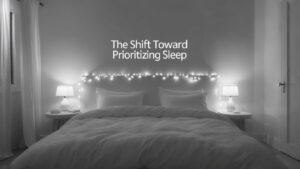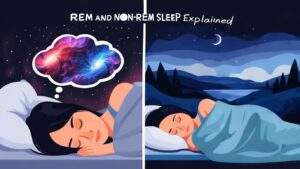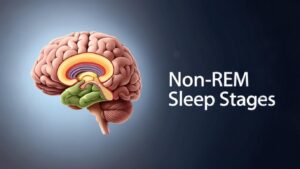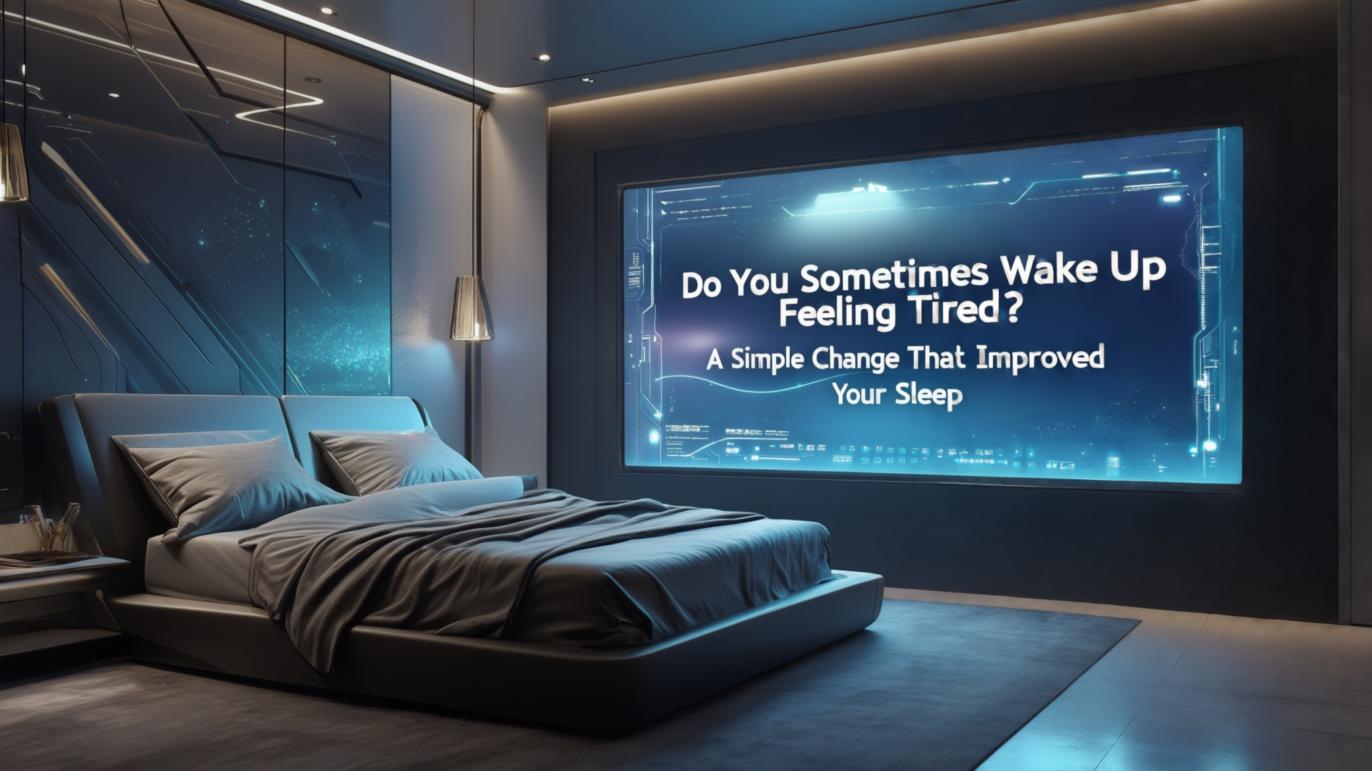Do you sometimes feel tired even after a full night’s sleep? You’re getting enough sleep, but are you sleeping well? Are you getting enough, deep, restorative sleep? If not, you need to wake up refreshed to fix it.
In this article, I’m going to tell you about a simple change I made to my evening routine that has given me the equivalent of two extra nights of high-quality, restful sleep over the past month. And as it turns out, it’s not that hard to do. It’ll take you less than 5 seconds a night.
The Shift Toward Prioritizing Sleep

I’m a bit obsessed with improving my sleep, and I know many of you are too. There’s been a shift towards prioritizing sleep these days, which is a significant shift from the “sleep when you’re going to die, hurry up” narrative of a few years ago. It feels like getting your 8 hours a night is the sleep version of getting your 10,000 steps.
Sleep Quantity vs. Sleep Quality

But a lot of talk revolves around getting enough sleep rather than improving the quality of your sleep. And when we talk about improving sleep quality, it’s mostly about avoiding things that ruin the quality of your sleep, rather than things that can improve it.
Alcohol is a clear example, which may help you fall asleep, but will significantly negatively affect the quality of your sleep.
How Do You Know If Sleep Quality Is an Issue?

So, how do you know if your sleep quality is also a problem? Well, you measure it. Measuring sleep quality has become quite sophisticated in recent years.
I remember, probably not that long after the first iPhone came out, I used to use an app called Sleep Cycle. You would leave it running on your phone all night – basically, you tuck the phone into the corner of your mattress and you fall asleep. This app uses the iPhone’s accelerometer to measure how much you move during the night. When you wake up the next morning, it will tell you how well you slept. Better than nothing, but only just.
Tech for Sleep Tracking

Then, for ages, I used my old Polar sports watch to measure my sleep. They would tell me that I had a terrible night’s sleep every night. But tech has moved on, and plenty of wearable devices will tell you not only how much sleep you’re getting, but how much time you spend in different stages of sleep.
So my question to you is: Can you track both the duration and quality of your sleep? How do you do it? Let me know in the comments below.
REM and Non-REM Sleep Explained

We can broadly break sleep down into two different types: REM sleep and non-REM sleep. You’ve probably heard of REM sleep — we’ll get to REM sleep in a minute.
Non-REM Sleep Stages

Let’s start with non-REM sleep, and it can be further divided into three stages of sleep. Stages one and two of non-REM sleep can be grouped into what we call light sleep. These are essentially the bridges between being awake and being in deep sleep.
Deep Sleep (Stage Three)

Stage three is where things start to get interesting. This is the first of the two stages we’re interested in today. Stage three is the deep sleep stage—sometimes called slow-wave sleep or delta-wave sleep, because if you were in a sleep lab, your brain would be visible on a monitor. This is a phase of intense rejuvenation, and getting enough of it is essential to how refreshed you feel in the morning.
During deep sleep, your body is in complete rest and recharge mode. Your heart rate, blood pressure, and breathing rate are at their lowest. Human growth hormone is produced in the highest amounts during this stage of sleep, which drives cellular repair and growth. So, if you are doing any type of resistance training, your muscles repair and grow to their greatest extent during this stage of sleep.
Getting adequate deep sleep is also essential for our immune system to function optimally. If you’ve ever wondered why you’re more likely to get sick if you’re sleep deprived, it’s probably because you’re not getting enough deep sleep.
Deep sleep also plays a role in consolidating memories, but in a different way than the last type of sleep I want to talk about today, which is, of course…
REM Sleep – More Than Just Dreams

REM sleep. This is one of the most studied and interesting areas of sleep. It is named so because the eyes move rapidly in different directions under the eyelids. It is perhaps best known for its role in dreaming. We can dream in other stages of sleep, but our most vivid, elaborate, and strange dreams occur during REM sleep.
But REM sleep is about more than just dreaming. Have you ever heard the phrase, “Everything feels better after a good night’s sleep”? That’s why REM sleep is a crucial time for emotional processing. I like to think of REM sleep as free overnight therapy that helps us resolve the emotional stress and trauma that we all accumulate as part of everyday life.
Flipping things around, it’s easy to see why people with insomnia often suffer from anxiety and depression.
REM sleep is also a time when your brain is restructuring and consolidating memories. This can lead to new insights and problem-solving, as well as creative ideas. Just as human growth hormone increases during deep sleep, most testosterone is produced during REM sleep.
Why Magnesium Matters

There are good and bad magnesium supplements, but I’ll talk about specific doses and formulations that I suggest later. But first, why should magnesium make such a difference in sleep quality?
Magnesium plays a vital role in our biochemical processes, over 300. It is important for energy production, DNA synthesis, and has a role in muscle relaxation, nerve function, and stress reduction, among many other things.
But in terms of key minerals, despite being so important to human health, it hasn’t been talked about much. We talk a lot about sodium and potassium, but not so much about magnesium. And there have long been concerns about magnesium deficiency in the modern diet, particularly due to soil deficiencies. Modern agricultural practices deplete the soil of magnesium faster than it can be replenished. The fertilizers we use focus on giving plants extra nitrogen, phosphorus, and potassium—because those are the things that help plants grow—but don’t replenish other important things like magnesium that give crops their nutrition.
Magnesium Supplementation
Of course, we would all like to get all our magnesium from food if we could. But there is a compelling argument why this is not possible, and why we should supplement with magnesium.
How Magnesium Affects Sleep
We think magnesium helps improve sleep quality in two ways. The first is by helping to produce a calming chemical called GABA.
GABA is a chemical messenger found in the brain, which can be thought of as a calming chemical. Its main function is to block certain signals in the brain, which slow down the activity of our nerves. Think of it as putting the brakes on our mental activity, ensuring that things don’t go too fast and out of control. This calming effect makes it important for relaxation.
Magnesium and NMDA Receptors
Unless there’s a problem. There’s a special type of receptor in our brain called NMDA receptors. The name doesn’t matter – unless you’re confusing it with MDMA, which is commonly known as ecstasy. NMDA receptors can work against GABA and reduce its calming effect. Magnesium can reduce the action of these NMDA receptors.
So, in simple terms, magnesium helps GABA do its job without interference, so you can relax more easily and sleep more deeply.
Circadian Rhythm and Magnesium

Magnesium also plays a role in your body’s daily cycle, as magnesium levels in our cells fluctuate with our circadian rhythm. Typically, magnesium is highest at night when you’re resting, and lowest during the day when you’re active.
It’s not well established why it helps with sleep, but when magnesium levels rise at night, it may help prepare your body for a good night’s sleep. Therefore, supplementing with magnesium in the evening may support this natural rhythm.
Variability and Supplement Types

Magnesium’s role in sleep has been studied to a certain extent, but not in detail. That’s how things are when there’s not a lot of money to be made — magnesium supplements are pretty cheap and no one owns the patent on them, so no one stands to make enough money from them to spend a lot of money researching them.
Additionally, there seems to be significant variability in response to magnesium supplementation between individuals. So, I make no promises that it will work for you the same way it did for me, but it may work even better.
Types of Magnesium Supplements
If you want to know if it works for you, you need to do your testing. There are three types of magnesium supplements available:
-
Magnesium glycinate – This is often my recommendation due to its high absorption rate.
-
Magnesium citrate – Also, a good choice and well absorbed.
-
Magnesium oxide – What to avoid: Although this is the cheapest option, its absorption rate is very low.
Just remember to check the packet for the correct dosage, as it varies between different types.
Final Thoughts and What’s Next
Magnesium plays an important role in improving sleep quality, but it’s only one aspect of improving sleep. My journey to achieving the perfect night’s sleep isn’t over yet.
One important question regarding today’s article that I hope to answer soon is this: If you are consistently getting high-quality sleep, do you need less sleep overall?




